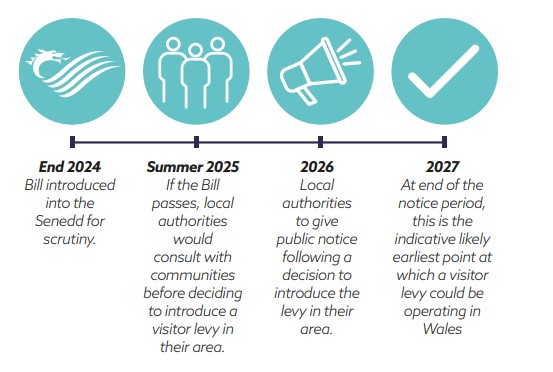A TOURIST tax in Wales could be in place as early as 2027, according to a Welsh Government document.
The controversial plan to charge visitors a levy to stay in Wales would also include Welsh people, according to a promotional leaflet posted online by the Welsh Government, entitled ‘A visitor levy for Wales: A contribution for a sustainable future’.
No price has yet been set, but the document says that if the proposal is given support, local councils will be able to set a tariff for overnight stays, with the money raised going towards ‘sustainable tourism, helping to grow our economy, support our communities’.
The document says: “We believe it is fair and reasonable to ask visitors to make a small contribution towards the wider costs of tourism.
“Our intention is to foster a sense of shared responsibility between residents and visitors, to protect, and invest in, local areas.
“We know that tourism plays a vital role in supporting local economies.
“But unbalanced, poorly supported tourism can also put pressure on local communities and undermine the high-quality amenities we all want to experience and to offer our visitors.”
The tourist tax would also apply to Welsh people, with the document adding: “If adopted by a local authority, the levy will apply to visitors staying in overnight accommodation, whether they have travelled from within Wales or elsewhere.”
The price visitors are charged will however have to be approved by Senedd members.

The Welsh Government plans to bring the proposal to the Senedd at the end of 2024, with a tourist tax potentially being in place in 2027.
The Welsh Government argues that tourist taxes are commonplace across Europe, with the document adding: “Visitor levies are common across the world and more tourist destinations, including in the UK, are introducing them to help fund the public services and infrastructure that are integral to the visitor experience.
“There is limited evidence to suggest visitor levies have a negative economic impact.
“Many of us will have paid a levy while abroad without noticing. Destinations such as Majorca, Amsterdam, Marseille, and Malta use funds from their levies to support a healthy visitor economy for everyone, protecting the infrastructure and services on which visitors depend.
“If you have booked a holiday to one of these popular destinations, you will be contributing to their tourism industry in the form of a levy.”
Manchester currently operates a tourist tax, with visitors charged £1 per person per night for staying in hotels and apartments in the city centre and Salford.
Reacting to the document, Welsh Conservative Shadow Tourism Minister, Tom Giffard MS said: "The Labour Government have failed to attract visitors to Wales since their harmful 182-day regulations came into force and plans to introduce a toxic tourism tax will only make things worse for the sector.
“Labour’s plans are particularly unwelcome at a time where they are already hitting Wales with their blanket 20mph limits that will damage the Welsh economy by up to £9 billion and harmful 182-day regulations driving self-catering accommodation providers out of business.
“The Labour Government’s obsession with taxing the tourism industry to reduce visitor numbers, as opposed to enhancing the tourism sector is the wrong approach for Wales."





Comments
This article has no comments yet. Be the first to leave a comment.